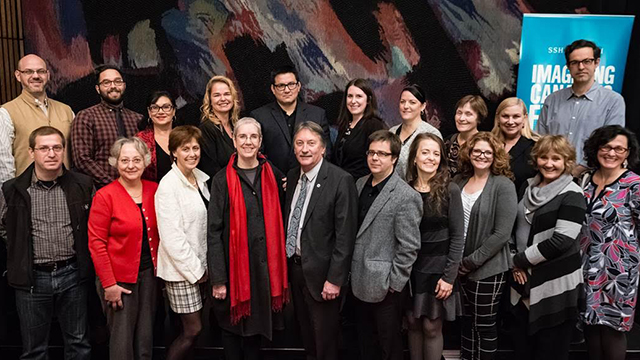
In November,2016, Martine Cavanagh and Laurent Cammarata were in Ottawa to participate in the Forum "Imaginer l'avenir du Canada." As part of this gathering, they presented the results of their study funded by the Social Sciences and Humanities Research Council of Canada(SSHRS).
In their opening statement, the professors gave findings on bilingualism in Canada. "One out of five Canadians claim French as their native language and, in Alberta, more than 81 000 Albertans stated that French was their native language in the 2011 census." Martine Cavanaugh reports.
"The Francophone population of Alberta grew faster than all the French speaking population in Canada while between 2006 and 2011, growth was 18 %,"Laurent Cammarata adds.
This population growth obviously had a direct impact on French immersion programs and Francophone Schools in Alberta. In so far as French immersion schools are concerned, 36 000 students were registered in 2011-2012; and this represented 5.9% of Alberta's student population. These past few years, the number of students has increased to 42 000. Furthermore, Alberta has the highest number of students taking the DELF exam.
There were 34 Francophone schools with 5483 students in 2010; five years later there were 39 schools counting 7000 students. "There is a 40th school that will open in Edmonton in September 2016 school year, while École publique Gabrielle-Roy will be divided into two sections (primary and secondary). There was a 27% student increase these past five years for Francophone schools." Martine Cavanagh points out.
As much as the Francophone population growth is good news, and the fact that these two systems flourishing are essential to the survival of French language and culture as well as to the promotion of bilingualism in Canada, the two professors think they are complex to implement and do not always manage to achieve the desired results.
Two issues were raised. The first is that both programs need to be optimized. ``Neither the Francophone education program nor the French immersion program has the expected results in terms of student achievement.'' Both professors identify.
In so far as Francophone Schools are concerned, students perform poorly in reading, writing, mathematics, and Science. We recently noticed an increase in students with language difficulties." Martine Cavanagh maintains.
"In so far as French immersion schools are concerned, although the programs are more efficient than traditional ones, the students obtained results below expectation in the quality of language production, particularly in terms of grammar, syntax and vocabulary." Laurent Cammarata mentions.
The lack of literature review on teacher training is the second issue both professors highlighted. "It is a key link. There is very little literature review on training (in both contexts) before 2004, and there is also a lack of literature review on this subject since 2004." Both Professors observe.
To correct the situation, a thematic hierarchy with Nvivo was developed, enabling to keep records of exchanges and collaborative writing.
This enabled us to identify three major themes representing three major challenges. The first challenge is the need to redefine the mission of French schools and immersion programs in the light of new social realities.
"In both immersion and Francophone schools, we observe significant changes in the composition of the school population; there are more and more students from immigrant homes and allophone students. Schools have also implemented inclusion policies," says Laurent Cammarata. "For the Francophone schools, we must also add that there are more and more students from exogamous homes." Martine Cavanagh continues.
All these findings, lead the two professors to suggest that the mission of Francophone schools has to be redefined. "According to research, identity and culture are two key elements. However, they evolve; they are plural; they are not transmitted, but they are built; they can be sources of insecurity; they are not binding, but are freely chosen." They explain.
These professors believe that schools should be at the service of every student by creating conditions to stimulate the building process of the student's culture and identity and motivate the free choice to engage in the Francophone social project.
The second challenge is to develop teaching methods adapted to the context of immersion or Francophone schools. "In terms of Francophone schools before 2004, the focus was on the development of principles of pedagogy articulated around identity and language development. Since 2004, the focus is on practical ways to put these principles into practice," states Martine Cavanagh.
In terms of Immersion schools, we developed teaching adapted around the promise of two for the price of one. "Learning the same subjects through a second language without any negative impact on student achievement and their native language development. This therefore requires the development of innovative teaching, but is complex to implement," said Laurent Cammarata.
The third challenge is to prepare future teachers. "In Francophone schools, there are knowledge and skills required to meet the first challenge linked to the school's mission and to the teacher's role to address the second challenge linked to the implementation of an adapted pedagogy," says Ms. Cavanagh.
As for immersion programs, it is essential to clarify the didactic repertoire of teachers in their specific contexts, to prepare teachers to identify learning problems and support the language development of future teachers.
The two professors completed their presentation by maintaining:
1) that there is still a lack of research on training in general (nature and impact, initial training, and instructors);
2) that there would be potential benefits to be gained from greater synergy between immersion and francophone schools (immersion research on language teaching for Francophone schools and francophone research on the cultural issues for immersion schools) ;
3) that there is a need to rethink the education programs.